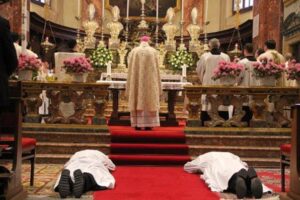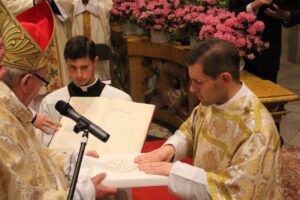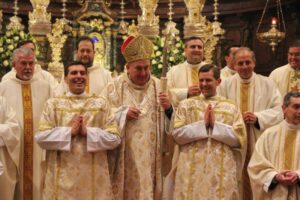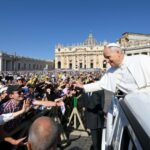On Saturday, April 16th, deacons Francesco Picaro, LC and Giovanni Malgaroli, LC were ordained by Mons. Franco Giulio Brambilla, bishop of Novara, in the Basilica of Gozzano dedicated to Saint Julian. Family members, friends, the novice Legionaries of Christ from Gozzano, a group from the headquarters of the general direction, and the center of higher studies attended the Eucharistic celebration. Several Legionary priests concelebrated, including Fathers Hernán Jiménez, rector of the community of theologians at the Center of Higher Studies, and Father Ignacio Sarre, rector of the religious in formation at the headquarters of the general direction. Some diocesan priests also concelebrated.
In his homily, Mons. Brambilla recalled: «Francesco and Giovanni come from the heart of this diocese, and it is beautiful that it is the diocesan bishop who ordains them.» He then described that: «Being a deacon is not just another incident in the journey but a character that remains for life. You know that the word deacon means servant, and that Jesus defined Himself as a deacon, but I think we can distinguish two characteristics, at least as suggested by the Word of God on this Fourth Sunday of Easter: the apostolic dimension and the pastoral dimension. The apostolic dimension, announced in the first reading, and the pastoral dimension in the second and third.»
 During the singing of the litany of saints.
During the singing of the litany of saints.Regarding the development of the apostolic dimension of the deacon, he said: «It is necessary to remain, as deacons, as servers, in the apostolic dimension. In chapter 13, we see this picture of Paul’s apostolic method, which began: a) in large cities, b) from what was available, in synagogues on Saturday, and preaching, because the Hebrew brother arriving from outside was granted the right to speak and preach during the synagogue liturgy on Saturday. Paul quickly took advantage of this opportunity. He entered from within and, through the explanation of Scripture, made the Christian leap. This indicates how our apostolate should be. An apostolate capable of entering into people’s circumstances and also into the religious forms established by tradition, and leading them to Jesus from within.»
He also said: «The theme of the Book of Acts of the Apostles is always that of contrasting success […] The contrast lies in the fact that pagans rejoiced and glorified the Word of the Lord, while the notable men of the city incited persecution and expelled them from their territory,» and then added: «The Gospel, as announced, and the apostolate, as exercised, always produce a double reaction: one like a seed falling on the ground and not bearing fruit, on the negative type of soil; or falling and bearing fruit, on the positive type of soil.»
Mons. Brambilla, addressing the ordinands, highlighted a particular aspect of the apostolic dimension with these words: «In this time that separates you from the full exercise of the priestly ministry, you must learn to be apostles capable, on the one hand, of immersing themselves in the flour to make it grow from within, like dough, living among people, and on the other hand, of making this life of people like a crunchy bread that takes on the flavor of the Kingdom, of the Regnum Christi. The Regnum Christi is not given except within the Regnum hominis, because if it is not a kingdom that passes over heads, it needs the flavor of the human. It is necessary to be able to say, as I have maintained for many years, the Christian word within the alphabet of human life. To learn the alphabet of human life, we must do as Jesus did, who for thirty years was silent, within the language of humans, and everything He said afterward was nothing but the Kingdom of Heaven is like a woman, a shepherd, a fisherman… This astonishing thing is the heart of the apostolate… To be apostles means to be sent into the human.»
 Father Giovanni Malgaroli, LC
Father Giovanni Malgaroli, LCThen, speaking about the second characteristic, being pastors, he said: «On this Fourth Sunday of Easter, the Sunday of vocations, the pastoral Sunday par excellence of the year […] You also heard the passage from the Book of Revelation that speaks of the Shepherd guiding His sheep to the waters of life […] The shepherd, as the gospel says, must know his sheep, must be in a condition to listen and to make his voice heard […] Being pastors is what makes others capable of opening their ears. In a society of images, the audio has become weak. We must create spaces for listening. The space for listening is not fusion but constitutes a difference. That through my voice, the Good Shepherd is heard. Through this difference, this pastoral relationship that does not absorb the other but makes him grow, guides him.»
He concluded his homily referring to the example of Jesus: «This is the pastoral dimension; it is not only about being close to people and establishing forms of proximity, also, but forms of proximity that make them grow. Jesus is a deacon precisely in this: “I am among you as one who serves.” He is in the middle, not distant. Jesus is the center and He is in the middle as one who serves. He serves the hearts of men to lead them to the mystery of God.»
At the end of the Eucharistic celebration, Father Giovanni’s mother said: «For us, it is a great joy. A grace that we received freely because we did nothing to deserve such a great grace. And also a great responsibility because he will certainly be a priest, but we are responsible for his priesthood, for his life as a priest.» Luigi Malgaroli referred to the beginning of his son’s journey and said: «After the first six months of initial bitterness, this day is the crowning of many prayers I directed to the Virgin Mary that granted me this possibility to see my son reach the first part of his mission in life.»
Father Giovanni shared something of his experience during the celebration: «It gave me great serenity during the ceremony to know that so many people were accompanying me with prayer. The participation of so many priests made me feel welcomed; I experienced this moment with great serenity, thinking: I am not here alone, I entrust myself to the Lord, and there are so many people waiting for me with open arms. Knowing I am not alone helped me.»
 Photograph with Mons. Brambilla and some of the concelebrants at the end of the Eucharistic celebration.
Photograph with Mons. Brambilla and some of the concelebrants at the end of the Eucharistic celebration.Father Francesco’s father said at the end of the celebration: «I remember that once in confession, the priest who was hearing my confession, when he found out I had a son with the Legionaries, told me that it was a great gift from God to be the father of a priest. I was very pleased then, and I confirm it now; it is a great gift from God.» Father Francesco’s sister also shared her experience: «When Francesco went to seminary, it was, like great things in life, a test. On one hand, I would have liked him to choose a path closer to home, here in Novara. We always prayed for him; I was sure he had listened to his heart. I remember the letters he sent us when he was in seminary, before there was a possibility to call him on the phone; we read them at home after dinner and couldn’t wait for the next letter from Francesco. I am happy for him because I feel it is his path.»
Father Francesco shared a meaningful moment for him during the Eucharistic celebration: «During the litany of the saints, it was a special moment because you feel the presence of those who have gone before you on this path of following the Lord, of those who have made a big difference in life. When you hear certain names like Francesco, Domingo, and many saints who have made the world tremble and made Jesus known, you ask them for help and grace to do the same to the extent that the Lord asks of you, in the role He has envisioned.»










